I just came back from Laracon EU. FOUR important talks presented new projects. In this post, I will summarize those videos and share my opinion.
So, we're talking about these talks:
- Taylor Otwell talked about Laravel Cloud, Starter Kits, and release dates
- Jess Archer presented the newest version of Nightwatch and announced the release dates
- Aaron Francis presented Fusion, another new way to combine PHP+JS
- Simon Hamp presented NativePHP to create mobile apps with Laravel+Livewire
If you want to watch the original talks, here are the links to the full 9-hour live-stream videos:
But now here's my summary of the main new launches.
Taylor Otwell: Mark February 24th in Your Calendars
Feb 24 will be a huge 4-in-1 release day. Taylor called it "the biggest day in Laravel history".
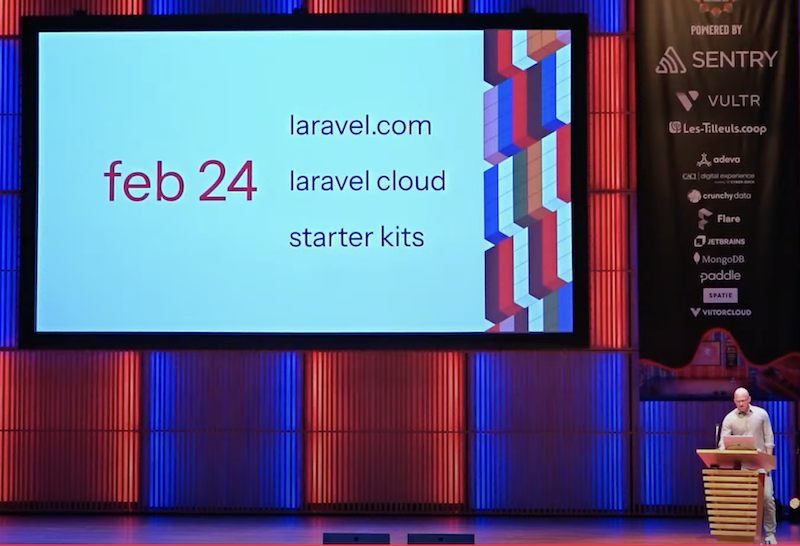
The slide above shows three things to launch, but there's actually one more: Laravel 12 will be released on the same day.
Laravel Homepage and Laravel 12
First, let's get two of those four out of the way as "less important".
We won't discuss the Laravel website in this post (let's just wait and see how it looks), but I'm sure David Hill and the design team will do a great job.
There's also not much to say about Laravel 12. Taylor hasn't announced any new features. He said his goal is to make it a "major release without any breaking changes."
So, I guess it will be safe to update your projects as soon as the packages bump up their versions. Laravel Shift helps the community with that by sending automatic pull requests to package creators.
Also, this "silent major release" is great news for me because I want to update many courses on LaravelDaily as soon as possible, so it should be relatively quick for text-based courses.
So, with the Homepage and Laravel 12 out of the way, let's move to more important announcements.
Taylor Otwell: New Laravel Starter Kits
Let's talk about starter kits based on what we know so far.
Here's the choice of THREE starter kits Taylor showed in his demo:
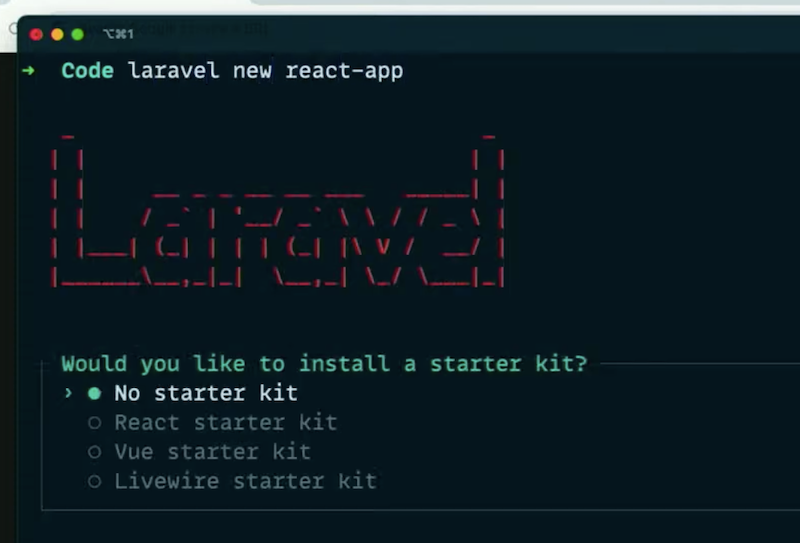
Those three will replace the current Breeze and Jetstream. However, if I understand correctly, you will still be able to use those two, and they will still be supported.
Here are a few screenshots from the stage (sorry for the quality, just print screens from YouTube):
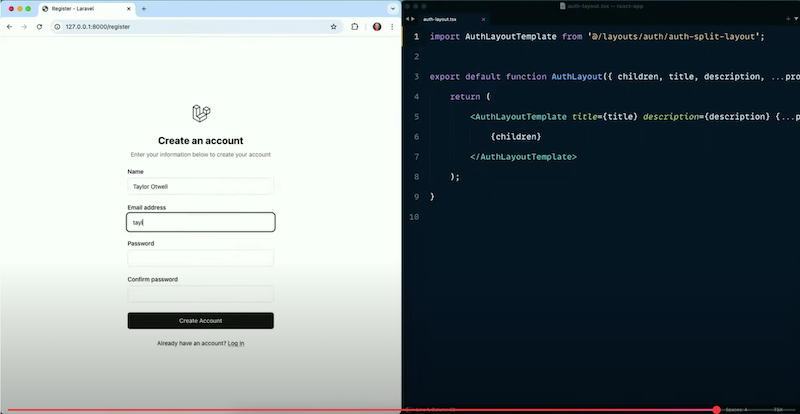
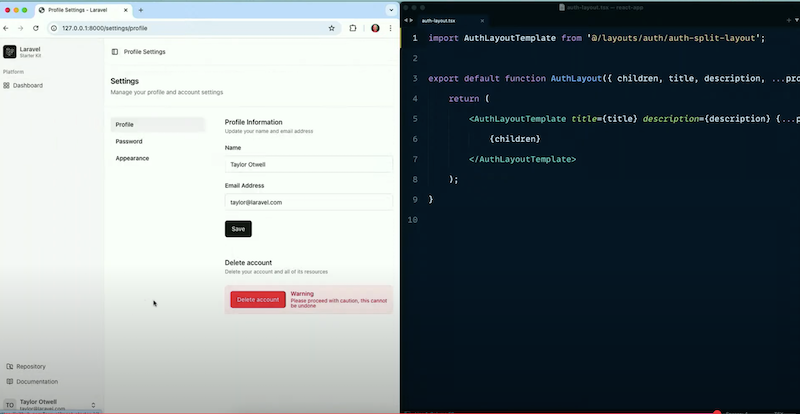
Inside the code, you will find a more modern design with a few easy layout customizations, like the top/sidebar menu and similar. Under the hood, they are using libraries like Shadcn for Vue/React and Flux UI for the Livewire version.
And yes, currently, Flux UI is not free, but Caleb Porzio agreed to make some basic components open-source for the new starter kits and for everyone to use.
Also, in the list, I haven't seen the "regular" Blade starter kit without JS/Livewire. I assume this is because these starter kits rely on Shadcn/Flux, which require JS or Livewire. In this case, you would probably still use Breeze.
My opinion about Starter Kits
After each tool announcement, I will share my personal opinion, trying to be an unbiased "independent journalist". So, here's what I think about the starter kits.
Overall, it's been quite a while since the starter kit visual updates, so I agree it was time for refreshment using modern front-end libraries.
As usual, many people will see those as a "threat to their current workflow" or "another new thing to learn", but hey, it's been 4 years since Breeze/Jetstream release.
I will definitely review them and put some tutorials on YouTube, so you should be okay with adopting any of those new starter kits. But also, they are optional, and you should be fine still using Breeze or Jetstream.
The only downside is that I see no "plain Blade" starter kit version, but we'll see how much pushback the community actually gives this. At this point, I'm not sure which starter kit I will choose for my simple demo projects. Still Breeze, probably?
Taylor Otwell: Laravel Cloud - Demo, Pricing and Launch
Next, Laravel Cloud. Taylor and the Laravel team worked long days during a week-long hackathon before Laracon to show the new stuff on stage.
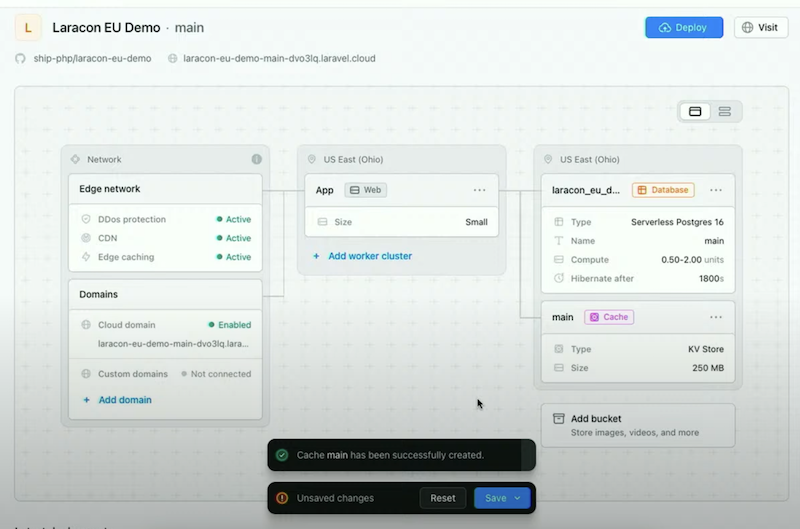
Taylor showed these things:
- How to go from a GitHub repository to a project deployed (with custom domain) in a few minutes
- How to configure databases (PostgreSQL for now, MySQL coming a few weeks after the launch). Interestingly, DB will auto-hibernate if it doesn't receive requests for X minutes (configurable). This means you don't pay for compute while DB is "sleeping". And it "wakes up" in hundreds of milliseconds. So Taylor emphasized that the Cloud is a no-brainer for side projects.
- How to configure queue, cache, and storage (S3-compatible, using Cloudflare R2)
- Running one-off Artisan command
- Viewing logs, both Laravel and server
- Enabling Scheduler or Laravel Octane in one checkbox
- Auto-scaling (choose min-max replicas) for predictable billing
Basically, it's an all-in-one system you would ever need for your Laravel project. It can be configured without leaving the Cloud dashboard, and there is no need to (ever?) SSH into the server.

Now, the important part: PRICING.
They will have three plans:
- Sandbox
- Production
- Business
Here are the slides with the prices.
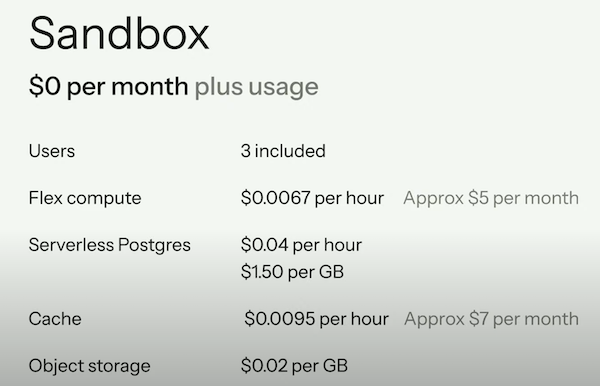
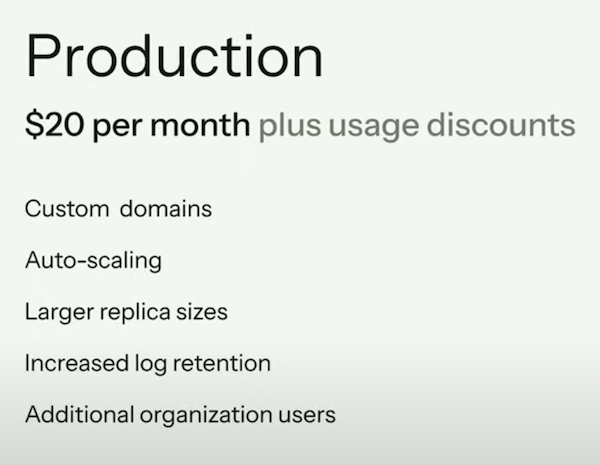
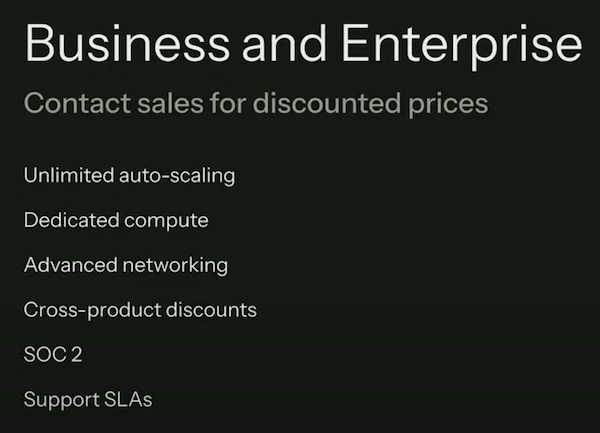
I think prices are pretty affordable and reasonable.
My Opinion on Laravel Cloud
It's time to share what I personally think about Cloud.
Of course, there will be huge hype and success initially, just because of the Laravel community. People will try it and praise it. In fact, people with early access are already doing that.
But as usual, on Laravel Daily, my opinion goes beyond the hype. I'm trying to be unbiased, raising questions about things I feel are important. (sometimes getting in trouble for that)
So, my question is: who is the target audience for using Cloud?
They present it as the fastest and most convenient way to ship the project to production. So, it's excellent for a hobby or small project that you have just started recently and want to host somewhere.
Also, it's great to target non-Laravel developers to try out the framework quickly and get to the result as fast as possible. That's why Laravel Cloud has a great Sandbox free plan. You just pay for server usage if you don't need custom domains.
But the question is: what about people and companies with existing projects? Do they really care about the FASTEST way? In my mind, I would put the focus on the requirements like these:
- Reliable
- Cost Effective
- Easy to Migrate to
We will see if the Cloud is convenient to migrate to only when real businesses report their impressions about it on real mid-size projects.
In my case, for example, we're using Digital Ocean + Forge for most projects, so would it make sense for me to migrate? I've tried to calculate the price, and it's almost the same. Of course, I will try with some smaller projects or demos and shoot a review, but I'm hesitant to move the Laravel Daily or Filament Examples website to the Cloud just yet. As with probably every new product release, it's worth waiting for the first reviews, more features, and bug fixes.
Speaking of the features, I have another showstopper in Laravel Cloud. I do have early access, but I haven't tried it. Why? Because they start with PostgreSQL only. No MySQL. Taylor tweeted that it would be available in a few weeks after the launch, but the problem is all of my projects are on MySQL. So, for now, I will probably not hurry with the review. It doesn't make sense for me to switch the driver just to be compatible with Laravel Cloud.
I've talked to the team, and apparently, there are technical challenges with MySQL, and PostgreSQL was easier to set up and configure with functions like scaling and auto-hibernating. But still, look at the chart from the latest State of Laravel 2024 survey:
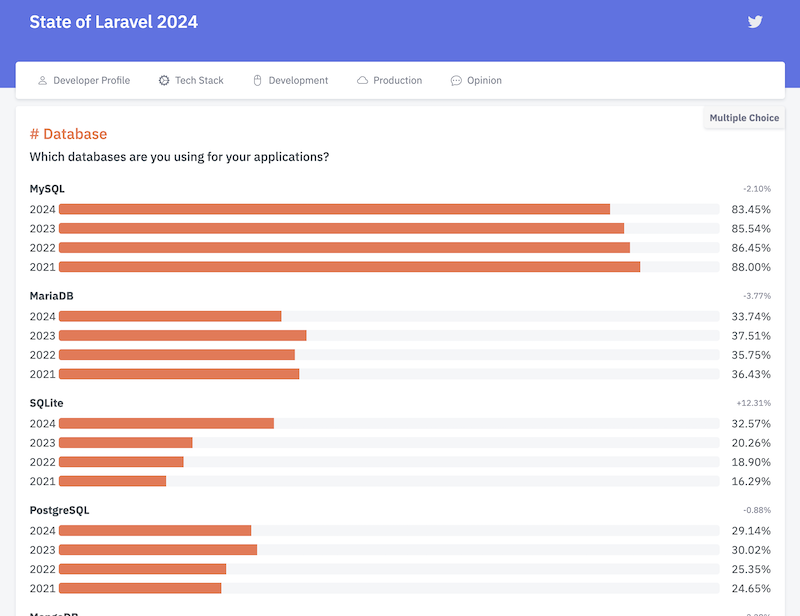
PostgreSQL usage is not even in the top 3! And MySQL is an overwhelming leader.
So, in my personal opinion, for better initial feedback, they should have delayed the release until MySQL is there. But maybe I'm overreacting here.
Still, even after those questions, Laravel Cloud is a very impressive tool with its own infrastructure. The Laravel team has done a fantastic job. As with every new tool, I would predict that we will probably see the actual adoption rates only after 6-12 months. This is just the beginning.
Taylor Otwell: "One More Thing" About Inertia
Also, Taylor mentioned, almost "by the way", that last week, Laravel company acquired Inertia from Jonathan Reinink and took over complete control of the project.
In other words, it means that Inertia is now a first-party package.
You can read this story from Jonathan's perspective in his tweet. I guess you can classify it as a business success story of someone starting an experiment open-source package that grows over the years and much later gets acquired by a larger company. Well done, Jonathan, and thank you for all those years.
Jess Archer: Laravel Nightwatch is Almost Ready
Next, Jess presented the latest version of Laravel Nightwatch and announced it should be available in May 2025. You can also already subscribe to the early access list.
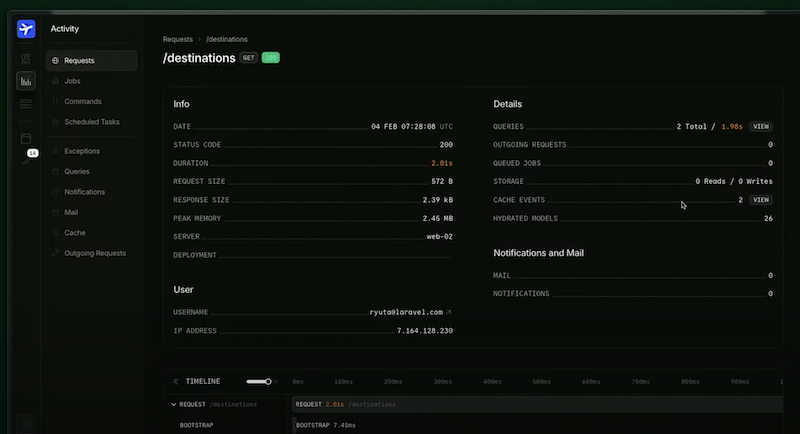
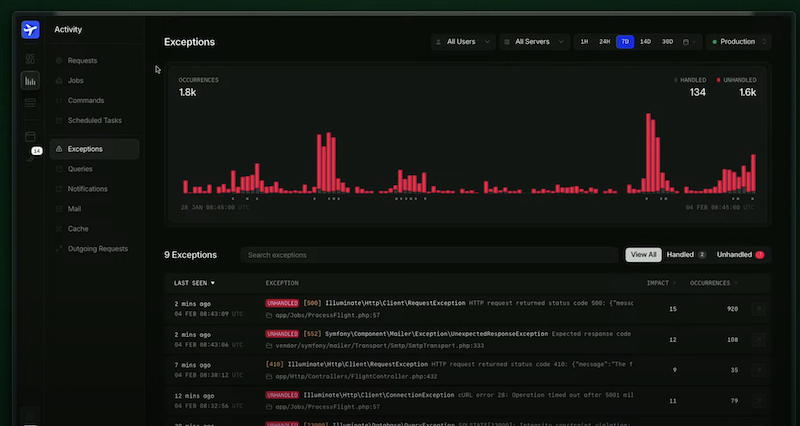
In short, Nightwatch allows you to monitor your application on such a deep level of Laravel application that has never been done before.
- Most called Eloquent queries (not only slowest)
- Timeline of each request - which Laravel file was the slow part
- Everything interlinked together very smoothly
What also impressed me is how hard the team worked on minimizing the performance impact, so you shouldn't even feel it.
- They use PostgreSQL to avoid MySQL limitations (Jess didn't mention the details of those limitations)
- They don't send the data to Nightwatch servers on each request: only when the locally collected data reaches 8 MB or 10 seconds, whichever comes first
Proof of this is they tried Nightwatch on their own Laravel Forge for two months, with a pretty impressive large number of requests:
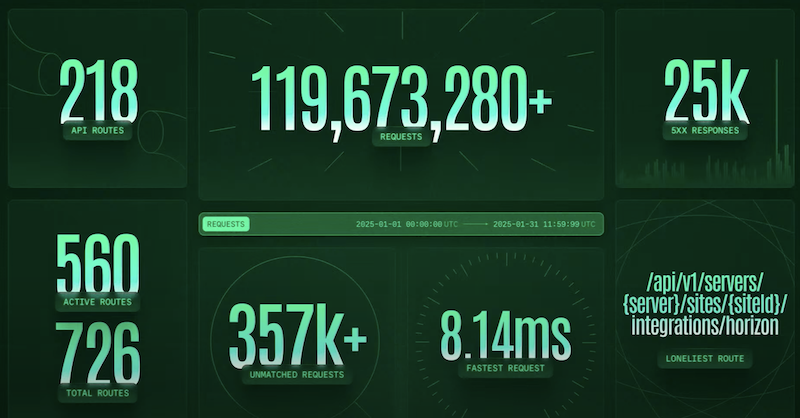
So, Nightwatch helped the team to identify the real issues that happened on Forge and quickly fix them within minutes:
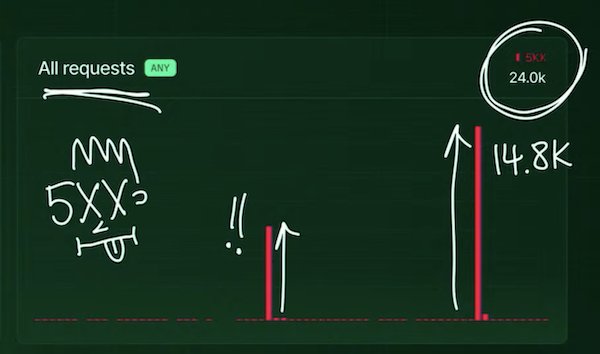
Another random number to help you understand the size of Laravel Forge's clients: over those two months, Jess showed there were 9.4k requests to create a new server. So you can imagine the number of paying clients, which is in the tens/hundreds of thousands.
Finally, Jess mentioned that Nightwatch evolved from Laravel Pulse, but Pulse will not be abandoned. It will still be maintained and supported.
My Opinion about Nightwatch
What can I say about Nightwatch? It looks amazing. Something I would have dreamed of in the earlier years of working with Laravel.
It looks like it will replace a few separate tools people use (like Sentry/BugSnag/Pulse/etc.) while making it more catered to Laravel-specific information.
It's also easy to install and start using, so I think businesses will migrate to (or start using) Nightwatch as soon as they can.
At Laracon EU, the Nightwatch booth was crowded all the time. It was almost impossible to get in and say hi to Jess, Tim, and others. In fact, it was more crowded than the booth where they demonstrated Cloud. That should say something about the audience's interest.
That said, important notice: they didn't announce the price of Laravel Nightwatch, which may be crucial to the decision to switch to it or add it to new projects.
Finally, there were two announcements that were not from Laravel core team members. To be fair, it is now harder to know who is and isn't on the core team because there are so many, with Ryan Chandler joining recently as one of the long-time active community members.
But yeah, those two below were not from the core.
Aaron Francis: Fusion - a new way for JS with Laravel
First, Aaron showed his new project called Fusion.
It allows you to write PHP code inside your Vue.js component, making it an all-in-one file for logic and presentation.
Here's a simple example:

And here's a more complex one:
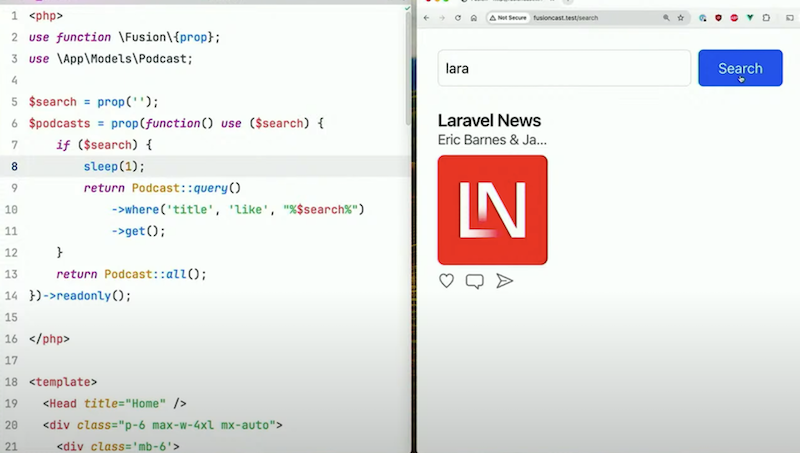
It feels like Laravel Folio + Livewire Volt, just for Vue (and React coming soon). In fact, Caleb Porzio himself confirmed the similarity replying to my tweet.
Fusion will be available on Monday. It will be a free package, but also Aaron launched a community group if you want to support his open-source work and get access to the "backstage". Starting from $15 per month.
My Opinion about Fusion
Disclaimer: Again, I'm trying to be neutral and not follow the hype. This is my personal opinion.
So, two things:
-
Very cool, impressive, and genius work by Aaron. He managed to recreate Laravel Folio + Livewire Volt but for JavaScript users. Wow.
-
That said... I'm unsure how many people will use it in their production projects.
Personally, I don't like that idea of all-in-one-file. It's hard to read, constantly scrolling up and down. That's why I don't use Livewire Volt.
So, I predict the success will be roughly similar to Volt's: it shouldn't go too mainstream, but it will definitely find fans who will play with it.
In general, I would question the idea of whether the world needs ANOTHER way to work with PHP+JS because newcomers come to me and ask, "What should I learn: Livewire or Inertia? Or Vue without Inertia? Or React? And Livewire with or without Volt? Wait, there is/was also Splade?" And now, we also have Fusion on this list.
All those new tools, born out of passion, look cool, but as a dev teacher, I would prefer a more streamlined path for newcomers.
And I know what some of you may say: "They are all optional to use". But imagine the confusion in the head of someone who sees all those keywords and gets lost before even starting with Laravel. They don't know upfront what is required/popular/optional. So, should I advise them to try them ALL?..
Simon Hamp: NativePHP for iOS with Real Example
The final item on today's list is that Simon showed how to create a mobile app with Laravel and Livewire (just annoying waiting time to compile it all). He also managed to put his app on the Apple App Store, fully approved by Apple, in three days!
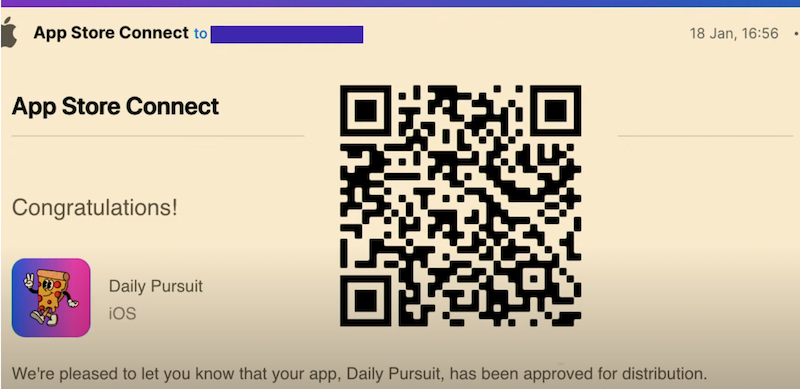
Here's the example code:
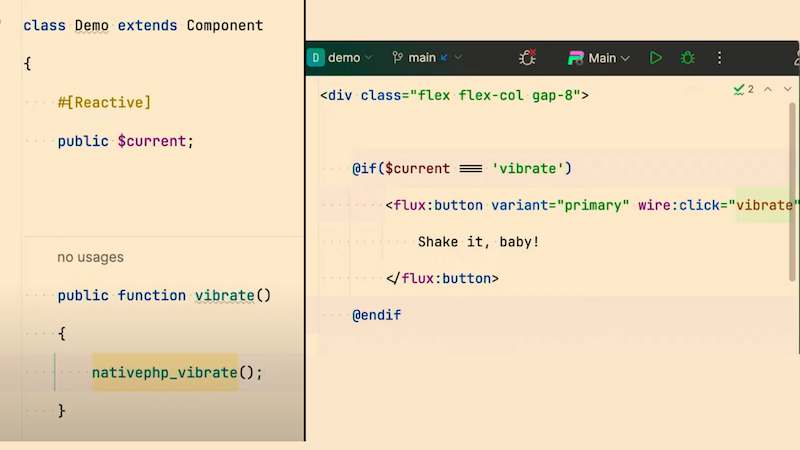
And here's the result after compilation, with XCode on the right:
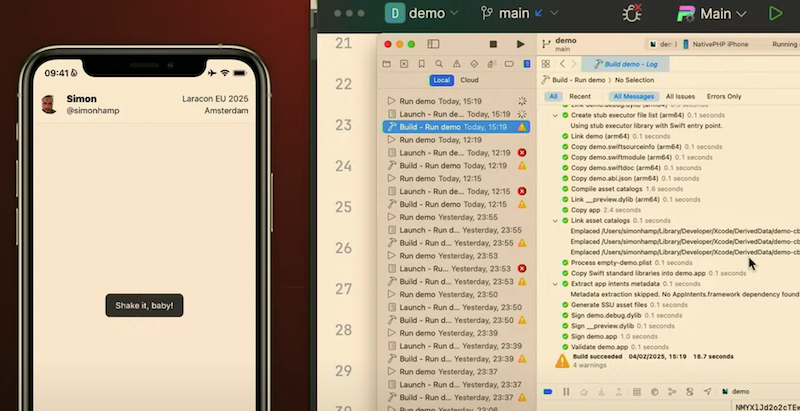
So, I guess it may transform from a cool hobby experiment to someone actually creating mobile apps with Laravel.
For now, it's iOS only, and it's not free. You can sign up and become a part of early access for $250. This may sound like a lot, but looking at how much energy Simon spends on it, I'm pretty sure he will find his target audience for this.
My Opinion about NativePHP For iOS
It's pretty similar to Aaron's Fusion.
-
Simon has done an incredible job of making this possible
-
But I'm unsure which companies would trust their mobile apps to this new tool instead of using widely adopted React Native, Flutter, or other tools.
But we'll see. Simon has a big audience of supporters for this project, and if he manages to deliver, we may see a mobile PHP revolution in the upcoming years.
Wow. That was A LOT.
So yeah, these were the main announcements from Laracon EU. I will come back to review many of them in more depth after the releases. Just not on the actual February 24, as I will be in Egypt with my family that day. Expect the first videos about it a few days after the release.
I shared my opinions on the new tools. Now, it's time for you to share yours. Be active in the comments!

Thanks for this incredible overview! I was part of a business that got bought and priorities change slowly but surely when there are investors involved. Return on investment eventually trumps passion. I just hope Laravel doesn't shift all their efforts too fast to commercial projects. $20 for an application that includes DDoS protection, CDN, and auto scaling isn't a lot but it's also not a little. One can deploy a small VM for $20 and run many sites, depending on load.
Your summary of Fusion is spot on - the reactive PHP ecosystem is getting very busy, especially for newcomers. Finally I'm excited to see more mobile stuff happening and super excited to have Livewire in the mobile mix.